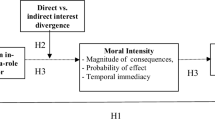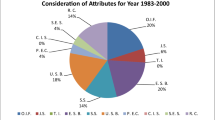Abstract
A growing public concern regarding ethical business conduct has stimulated marketing research in the ethics area. This study is the first empirical research to investigate the relationship between a code of ethics and sales force behavior. The findings present preliminary evidence that a well communicated code of ethics may be related to ethical sales force behavior. Furthermore, it appears that a sales force that is employed in such an environment can be profiled as being relatively high in job performance and receiving equally high satisfaction from their positions. Suggestions are made for future research and recommendations are offered for marketing practitioners.
Similar content being viewed by others
References
Behrman, D. N. and W. D. Perreault, Jr.: 1984, ‘A Role Stress Model of the Performance and Satisfaction of Industrial Salespeople’,Journal of Marketing 48 (Fall), 9–21.
Behrman, D. N. and W. D. Perreault, Jr.: 1982, ‘Measuring the Performance of Industrial Salespersons’,Journal of Business Research 10, 355–370.
Boling, T. E.: 1978, ‘The Management Ethics' Crisis: An Organizational Perspective’,Academy of Management Review 3, 360–365.
Brenner, S. N. and E. A. Molander: 1977, ‘Is the Ethics of Business Changing’,Harvard Business Review (January–February), 57–71.
Chonko, L. B. and S. D. Hunt: 1985, ‘Ethics and Marketing Management: An Empirical Examination’,Journal of Business Research 13, 339–359.
Chonko, L. B. and J. J. Burnett: 1983, ‘Measuring the Importance of Ethical Situations As a Source of Role Conflict: A Survey of Salespeople, Sales Managers, and Sales Support Personnel’,Journal of Personal Selling and Sales Management 3 (May), 41–47.
Churchill, Jr., G. A., N. M. Ford, and O. C. Walker, Jr.: 1974, ‘Measuring the Job Satisfaction of Industrial Salesmen’,Journal of Marketing Research 11 (August), 254–260.
Comer, J. M., K. A. Machleit and R. R. Lagace: 1989, ‘Psychometric Assessment of a Reduced Version of INDSALES’,Journal of Business Research 18, 291–302.
Crawford, M. C.: 1970, ‘Attitudes of Marketing Executives Toward Ethics in Marketing Research’,Journal of Marketing 34 (April), 46–52.
Cressey, D. R. and C. A. Moore: 1983, ‘Managerial Values and Corporate Codes of Ethics’,California Management Review 25 (Summer), 53–77.
Dubinsky, A. J.: 1985, ‘Studying Field Salespeople's Ethical Problems: An Approach for Designing Company Policies’, inMarketing Ethics: Guidelines for Managers, Gene R. Laczniak and Patrick E., (eds.) (Murphy, Lexington Books, Lexington, MA).
Dubinsky, A. J., R. D. Howell, T. N. Ingram and D. N. Bellenger: 1986, ‘Salesforce Socialization’,Journal of Marketing 50 (October), 192–207.
Dubinsky, A. J., and M. Levy: 1985, ‘Ethics in Retailing: Perceptions of Retail Salespeople’,Journal of the Academy of Marketing Science 13(1) (Winter), 1–16.
Dubinsky, A. J., E. N. Berkowitz and W. Rudelius: 1980, ‘Ethical Problems of Field Sales Personnel’,MSU Business Topics 28 (Summer), 11–16.
Ferrell, O. C., L. G. Gresham and J. Fraedrich: 1989, ‘A Synthesis of Ethical Decision Models for Marketing’,Journal of Macromarketing (Fall), 55–64.
Ferrell, O. C. and K. M. Weaver: 1978, ‘Ethical Beliefs of Marketing Managers’,Journal of Marketing 42 (July), 69–73.
Ferrell, O. C. and L. G. Gresham: 1985, ‘A Contingency Framework for Understanding Ethical Decision Making in Marketing’,Journal of Marketing 49 (Summer), 87–96.
Ingram, T. N. and R. W. LaForge: 1989,Sales Management: Analysis and Decision Making (The Dryden Press, NY: New York).
Krugman, D. M. and O. C. Ferrell: 1981, ‘The Organizational Ethics of Advertising: Corporate and Agency Views’,Journal of Advertising 10(1), 21–30.
Levy, M. and A. J. Dubinsky: 1983, ‘Identifying and Addressing Retail Salespeople's Ethical Problems: A Method and Application’,Journal of Retailing 59(1) (Spring), 46–66.
Longenecker, J. G., J. A. McKinney and C. W. Moore: 1988, ‘Egoism and Independence: Entrepreneurial Ethics’,Organizational Dynamics (Winter), 64–72.
Nichols, M. L. and V. E. Day: 1982, ‘A Comparison of Moral Reasoning of Groups and Individuals on the Defining Issues Test’,Academy of Management Journal 25 (March), 201–208.
Rudelius, W. and R. A. Bucholz: 1979, ‘Ethical Problems of Purchasing Managers’,Harvard Business Review 57 (March–April), 8ff.
Trawick, F. and W. R. Darden: 1980, ‘Marketers' Perceptions of Ethical Standards in the Marketing Profession: Educators and Practitioners’,Review of Business and Economic Research 16 (Fall), 1–17.
Trevino, L. K.: 1986, ‘Ethical Decision Making in Organizations: A Person-Situation Interactionist Model’,Academy of Management Review 11(3), 601–617.
Tyagi, P. K.: 1985, ‘Relative Importance of Key Job Dimensions and Leadership Behaviors in Motivating Salesperson Work Performance’,Journal of Marketing 49 (Summer), 76–86.
Walker, O. C., G. A. Churchill, and N. M. Ford: 1979, ‘Where Do We Go from Here? Selected Conceptual and Empirical Issues Concerning the Motivation and Performance of the Industrial Salesforce’, inCritical Issues in Sales Management: State-of-the-Art and Future Research Needs, G. Albaum and G. A. Churchill, (eds.) (Eugene: College of Business Administration University of Oregon).
Weaver, K. M. and O. C. Ferrell: 1977, ‘The Impact of Corporate Policy on Reported Ethical Beliefs and Behavior of Marketing Practitioners’, in B. A. Greenberg (eds.),Contemporary Marketing Thought (Chicago, American Marketing Association), 477–481.
Weeks, W. A. and J. Nantel: 1991, ‘An Investigation of Sales Force Ethics: A Randomized Response Approach’, inMarketing Theory and Application, T. L. Childerset al. (eds.), AMA Winter Educator's Conference, 128–133.
Wotruba, T.: 1990, ‘A Comprehensive Framework for the Analysis of Ethical Behavior, with a Focus on Sales Organizations’,Journal of Personal Selling and Sales Management 10 (Spring), 29–42.
Author information
Authors and Affiliations
Rights and permissions
About this article
Cite this article
Weeks, W.A., Nantel, J. Corporate codes of ethics and sales force behavior: A case study. J Bus Ethics 11, 753–760 (1992). https://doi.org/10.1007/BF00872307
Issue Date:
DOI: https://doi.org/10.1007/BF00872307




